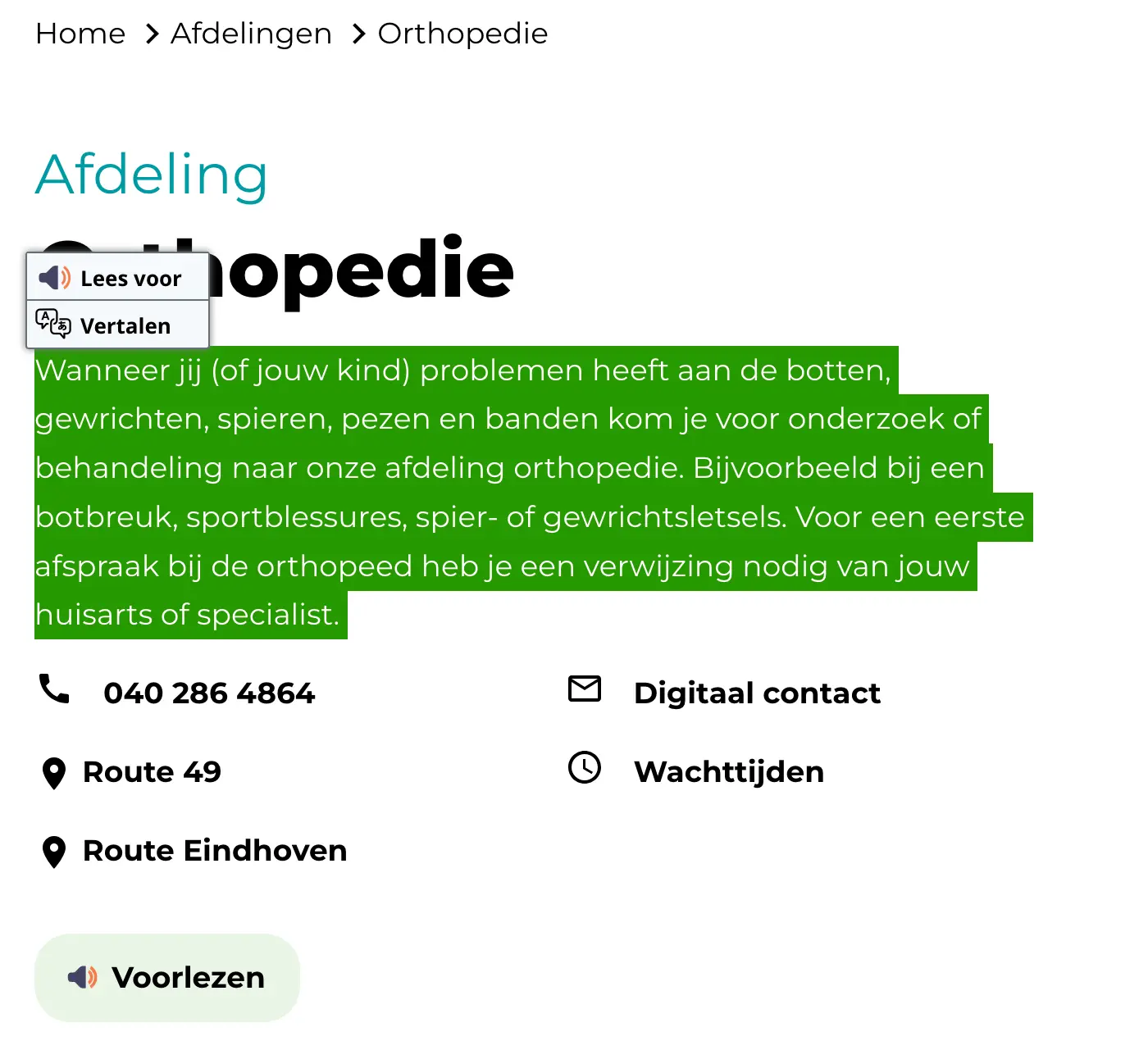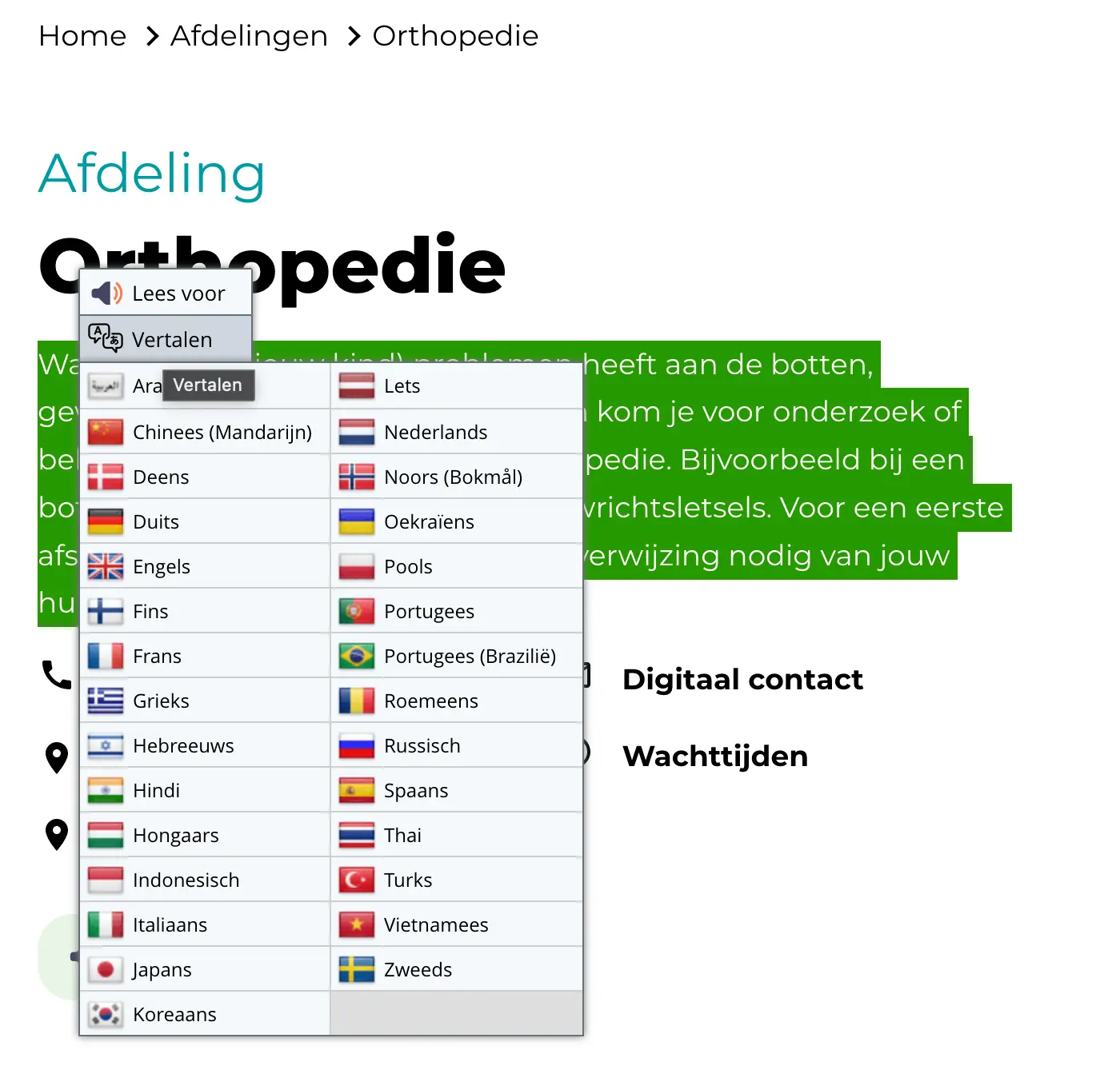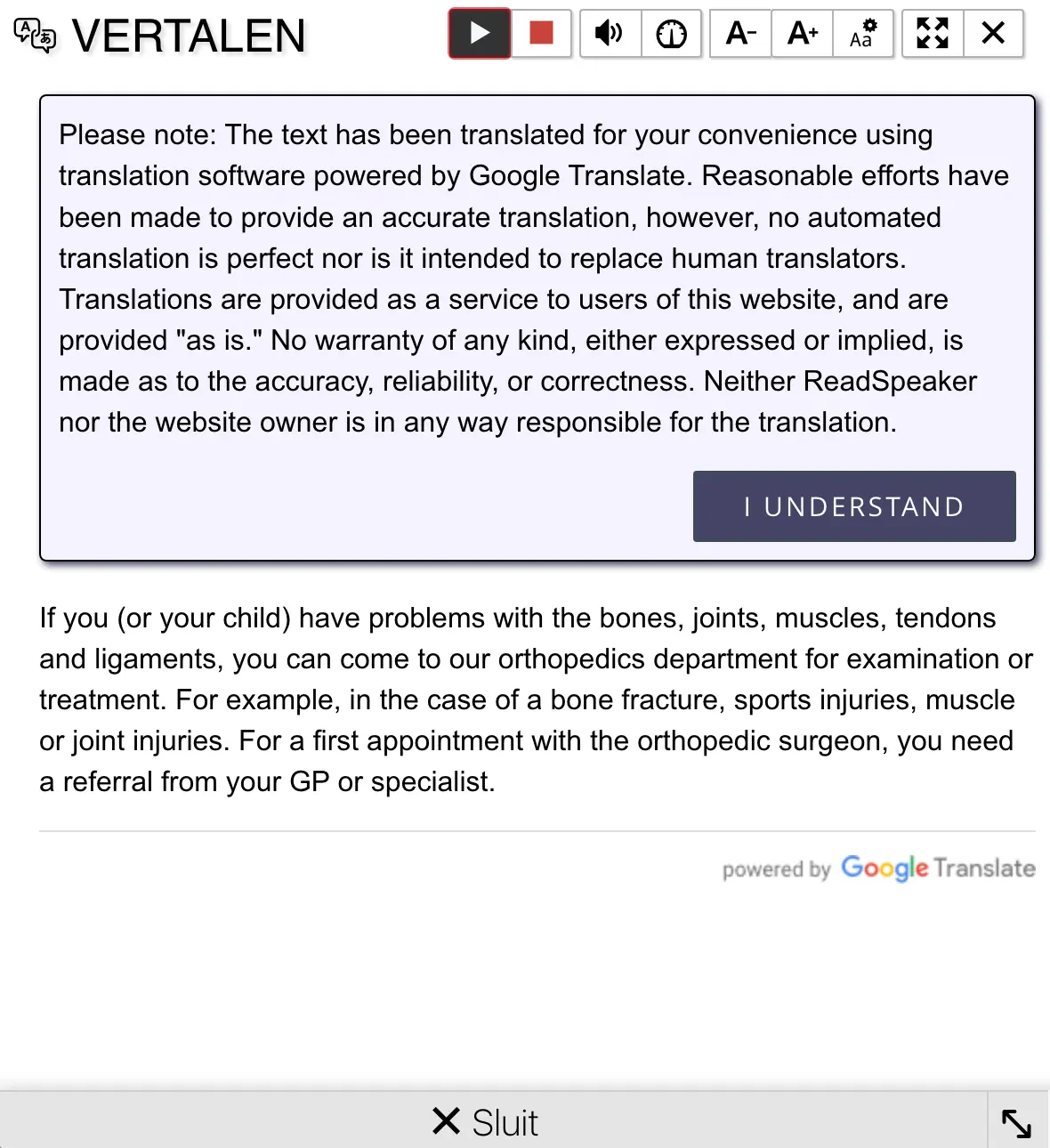Sedation during an examination or treatment
Anesthesiologie
You will soon undergo an examination or treatment that needs sedation. In this folder you can read about sedation: what it is, why it may be necessary, and what you can expect.
What is sedation?
Sedation literally means lowering the awareness of a patient. This is done by administering medicines via an infusion in your hand or arm. For some treatments it is important that you can be woken up, but thanks to the medicines that we use you would not experience this as unpleasant. During sedation you retain important reflexes such as breathing and swallowing. The sedation is given by a sedation practice specialist.
Sedation can be administered to make an unpleasant or painful examination or treatment happen as comfortably as possible. Prolonged duration of an examination or treatment can also be a reason for sedation. Two types of medicines are used for sedation.
- A sleeping aid reduces anxiety and lowers awareness so you can tolerate an unpleasant procedure better. You will become sleepy and drowsy, and will have little or no awareness of the examination or treatment. You may even forget the examination or the treatment.
- Analgesic medication (pain relief) is given to diminish or suppress the painful moments of the examination or treatment. This pain medication can also make you sleepy and drowsy.
Preparing for the sedation
During the preoperative screening you will have a talk with someone from the anaesthesiological screening staff to get a clear indication of your health and explain about sedation. If you take medication, a phone call will also be planned with the medicines clinic, to get an overview of the medication.
Eating and drinking
Sedation can only take place if you have kept an empty stomach in the preceding hours, so for several hours you may not eat, drink or smoke. This means:
- 6 hours before admission time you can no longer smoke, eat, or drink anything except water.
- 2 hours before admission time you can no longer drink water either.
- Approved medication can be taken only with a sip of water.
It is important for you to have an empty stomach. If that is not the case, the food or drink that is still in the stomach can end up in your lungs during or around the time of the procedure. This could cause a lung inflammation and respiratory problems. For this reason it is extremely important that you adhere to these requirements for an empty stomach.
IMPORTANT: If you do not follow these instructions, the examination or treatment may be cancelled.
Smoking
Starting 6 hours before the sedation you are not allowed to smoke. Your treating physician may make other arrangements with you, depending on the type of examination or treatment. Please adhere to the agreements you make with your doctor.
Medicines
If you take medicines, you will be told during the preoperative screening whether you must take them on the day of the examination or treatment. If you must take them, then do so before 7:30 with a small sip of water, even if you have to be on an empty stomach. You will receive a medication overview that includes the guidelines for your medication on the day of your examination or treatment. You will either be given the medication overview during the preoperative screening or it will be mailed to you.
Depending on the treatment, you may have to take pain medication at home before the treatment. If that is the case, you will get a prescription from the treating physician.
Start of the treatment or examination
You will lie down on a treatment table or bed in the treatment room. The sedation practice specialist will meet you there, and he/she will place electrodes on your chest or arms to monitor your heart rhythm. A pulse oximeter is placed on one of your fingers, to measure your blood oxygen levels. A cuff on your arm measures your blood pressure every three minutes. During the first measurements an infusion is placed and the oxygen supply is connected. Next, the sleep medication is administered via the infusion. Once you are asleep, the treating physician starts the examination or treatment.
After the sedation
Once the doctor is done with the examination or the treatment, the sedation specialist will stop giving you sleeping aids and analgesics. You will wake up soon after. You will be monitored for at least one hour in the recovery room of the operation room or the treatment ward. Depending on the agreements made with your treating physician, you can go home after that. If necessary, you will be given a prescription for painkillers to take at home.
Side effects and complications of sedation
Blood oxygen levels and/or blood pressure may drop during the examination or the treatment. The sedation practice specialist has different ways to deal with this. Other side effects and complications are comparable to those of general anaesthesia, such as nausea and vomiting, or are specific to the treatment you are getting.
Always bring the following
- A valid ID
- A note with the name and phone number of your contact person (next of kin)
- The medication list (of the preoperative screening)
Miscellaneous
- If you have a dental prosthesis or plates, you need to take them out. Bring a box to store them during the examination or treatment.
- Take off your watch and jewellery. We recommend that you leave them at home.
- Take out your contact lenses. You can keep your eyeglasses on until you go to sleep, so bring a case to safely keep them.
- Remove any make-up or nail polish (even transparent polish). If you wear gel or acrylic nails, remove at least one nail (preferably that of your index finger) per hand. It is important for us to see the natural colour of your skin and nails.
- You may have to wear a hospital gown during the examination or treatment.
- Do not apply body lotion or other creams on the day of the examination or treatment.
- If you have a CPAP machine or MRD, bring it with you if you must stay overnight at the hospital. If you are discharged soon after the examination or treatment, you should make sure to use it the first night.
- The medicines given during the sedation can make hormonal contraception less effective, so for 7 days after the examination or treatment you should use additional contraception (like a condom) to reduce the chances of getting pregnant.
- If you have any allergies, always report them.
Other
- Do not take important or drastic decisions on the day of the treatment.
- Make sure someone accompanies you. After the treatment you are not allowed to drive or go home alone. This also means you cannot take a taxi or bus on your own. Arrange in advance for someone to bring you home.
- Contact us if any changes occur in your health condition or medicine use between the talk with the anaesthesiological screening staff and the examination or treatment.
- If possible, arrange for someone to be with you the first night after the examination or treatment.
When should you contact us?
Contact your treating physician if you have complaints or symptoms you are not comfortable with.
Recovery
It can take a while before you feel in shape again, that is normal. Your body needs time to recover from the sedation and the treatment. This can take 1 to 3 days.
Do you have other questions?
If after reading this folder you still have questions about the sedation, you can call preoperative screening at 040 - 286 48 10.
If you have any other medical questions about your operation or treatment, please contact the outpatient clinic of your treating specialist.



